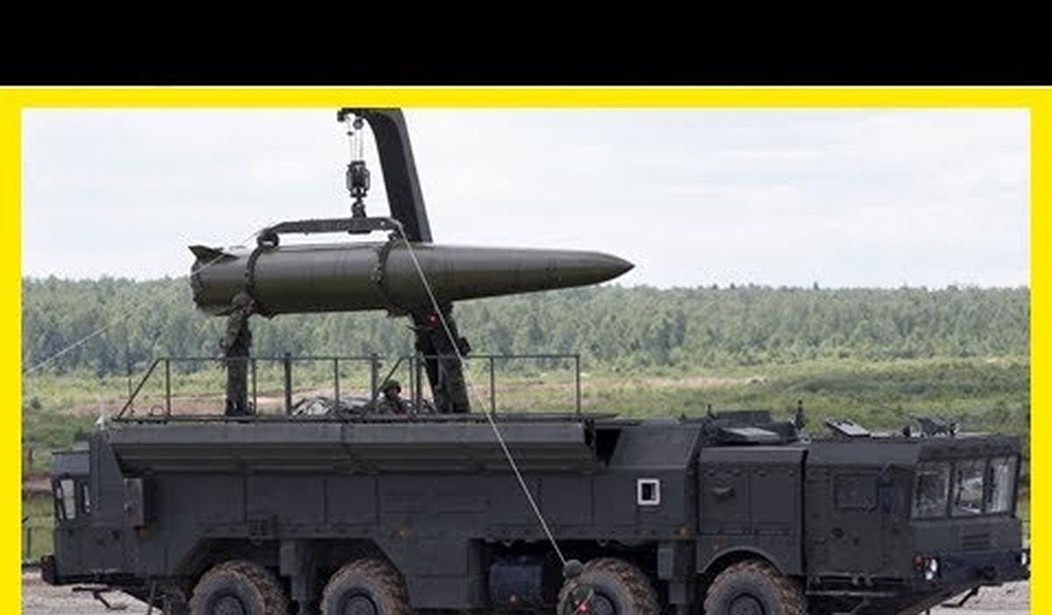On Tuesday, U.S. Secretary of State Mike Pompeo announced that the United States was withdrawing from the 1987 Intermediate-Range Nuclear Forces (INF) Treaty because of Russian violations.
The Russians deny they are violating the treaty and are threatening “retaliation” for the U.S. action. Russian President Putin claims that the U.S. is the one violating the deal by allocating money for research into intermediate-range missiles. In fact, such research is allowed under the treaty and Putin is just blowing smoke.
NATO foreign ministers are backing the U.S. move.
“Allies have concluded that Russia has developed and fielded a missile system, the 9M729, which violates the INF Treaty and poses significant risks to Euro-Atlantic security,” the Nato foreign ministers’ statement reads.
“We strongly support the finding of the United States that Russia is in material breach of its obligations under the INF Treaty.
“We call on Russia to return urgently to full and verifiable compliance. It is now up to Russia to preserve the INF Treaty.”
According to CBS News, U.S. intelligence has ironclad proof that the new missile system directly violates the treaty:
The U.S. has shared intelligence evidence with its NATO allies that it says shows that Russia’s new SSC-8 ground-fired cruise missile (also known as the Novator 9M729) could give Moscow the ability to launch a nuclear strike in Europe with little or no notice. The bilateral INF treaty between Washington and Moscow banned all land-based cruise and ballistic missiles with a range between 310 and 3,410 miles. Russia says the range of the new system does not exceed 310 miles.
Early in 2017 U.S. officials told CBS News national security correspondent David Martin that they had monitored Russian flight tests in which the SSC-8 flew in excess of 300 miles. Those tests were conducted secretly near the end of the Obama administration, but it was left up to the Trump White House to decide how to respond. U.S. officials told Martin the deployment of the SSC-8 units was such a blatant violation of the INF treaty that it called into question the value of any future arms control treaties with Russia.
Putin made a big deal in his statement about the U.S. research program, but in fact, our program was in response to the Russian development of the Novator:
Putin, speaking on Wednesday, reiterated his stance that it was the U.S. unilaterally giving up on the treaty and claiming, “they show no proof of violations on our side.” He also pointed to the U.S. decision to research new weapons that would violate the INF agreement.
He said Russia’s response would be, “simple; we will also do it (develop intermediate-range nuclear and conventional missiles). I remind you that this year the U.S. Congress — before the intention to exit the treaty was announced — has allocated money for research and development of those missiles.”
“It was done quietly, they thought we won’t notice it,” said Putin. “But the development of these missiles is already in the Pentagon budget. And they have publicly announced the exit (from the treaty) only afterwards.”
“We are against destruction of the treaty,” Putin added. “But if it happens, we will react accordingly.”
Even the liberal and dovish Brookings Institution is calling out the Russians for their violation and challenging them to demonstrate they are in compliance:
Russian officials heatedly deny the charge. The foreign ministry spokesperson claimed, “the 9M729 land-based cruise missile fully complies with the treaty’s requirements.” A senior arms control official in Moscow asserted that the missile’s range does not exceed 500 kilometers.
OK, show that.
Russian and U.S. officials could use the Special Verification Commission established by the INF Treaty to work out procedures for Russia to exhibit a 9M729 to U.S. technical experts.
But Putin refuses to prove Russia’s innocence — probably because he knows he’d be caught like a kid with his hand in the cookie jar if he dared demonstrate the missile’s capabilities in public.
The INF treaty benefited Europe far more than the U.S. The fact that NATO countries are fully backing Trump on this issue is a good sign. Putin knows that Russia cannot win an intermediate-range missile arms race, so perhaps this show of solidarity by NATO will lead the Russian president to comply with U.S. wishes and scrap their missile program.










Join the conversation as a VIP Member